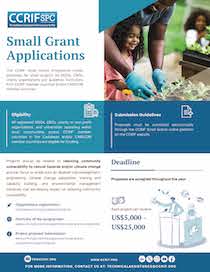Bridgetown, Barbados 12 May, 2010 – On 12 and 13 May, over 40 representatives from Caribbean and international agencies will meet in Barbados to discuss the initial results from a recent investigation into the Economics of Climate Adaptation (ECA) in the Caribbean. This study, funded by the Caribbean Catastrophe Risk Insurance Facility as part of its technical assistance programme, was launched in February to enable the development of a fact base for developing sound climate change adaptation strategies in the region.
Climate change is considered to be the most pervasive and truly global of all issues affecting humanity, posing a serious threat to the environment as well as to economies and societies - the impacts of which are likely to adversely affect sectors such as tourism and agriculture. The focus of this study is on the impact of climate risks and change on a country’s infrastructure (including housing), and tourism and travel, agricultural, industrial and services sectors.
Since February, a team composed of Caribbean Risk Managers on behalf of CCRIF, the Caribbean Community Climate Change Centre and other regional partners, has been intensely involved in data collection and analysis for a number of countries with analytical support provided by McKinsey & Company and Swiss Re.
The workshop, to be held at the Caribbean Development Bank, will provide an introduction to the Economics of Climate Adaptation approach and its application in the Caribbean and will focus on sharing the findings of the study, examining the key insights and results for wind, sea level rise/coastal flooding, inland flooding and salinisation of groundwater.
The final outputs of this study will include a risk baseline which will provide transparency about current and future expected losses from climate risks under three climate change scenarios; and assessment of adaptation measures – identification of feasible and applicable measures to adapt to the expected risks based on quantitative analysis of total cost and expected benefits of risk mitigation and transfer measures.
The results of the study will assist decision makers throughout the Caribbean region in defining and developing sound adaptation strategies and business cases which can be incorporated into national development plans. The recent Climate Change Conference in Copenhagen reconfirmed the commitment to provide funding and technical assistance for climate adaptation to developing countries. The ECA study will help Caribbean leaders develop programmes that will be strong candidates for adaptation assistance.
About CCRIF: CCRIF is a risk pooling facility, owned, operated and registered in the Caribbean for Caribbean governments. It is designed to limit the financial impact of catastrophic hurricanes and earthquakes to Caribbean governments by quickly providing short term liquidity when a policy is triggered. It is the world’s first and, to date, only regional fund utilising parametric insurance, giving Caribbean governments the unique opportunity to purchase earthquake and hurricane catastrophe coverage with lowest-possible pricing. CCRIF represents a paradigm shift in the way governments treat risk, with Caribbean governments leading the way in pre-disaster planning. CCRIF was developed through funding from the Japanese Government, and was capitalised through contributions to a multi-donor Trust Fund by the Government of Canada, the European Union, the World Bank, the governments of the UK and France, the Caribbean Development Bank and the governments of Ireland and Bermuda, as well as through membership fees paid by participating governments.
Sixteen governments are currently members of CCRIF: Anguilla, Antigua & Barbuda, Bahamas, Barbados, Belize, Bermuda, Cayman Islands, Dominica, Grenada, Haiti, Jamaica, St. Kitts & Nevis, St. Lucia, St. Vincent & the Grenadines, Trinidad & Tobago and the Turks & Caicos Islands.
For more information, contact Simon Young at syoung@caribrm.com or CCRIF at pr@ccrif.org.





